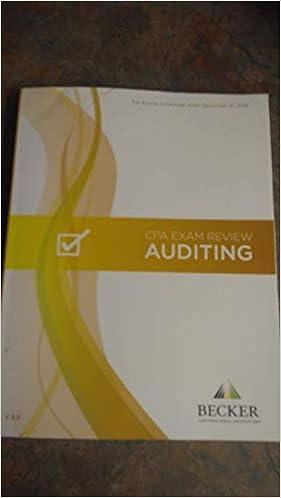Question
Overhead variances, ethics. Zeller Company uses standard costing. The company has two manufacturing plants, one in Nevada and the other in Ohio. For the Nevada
Overhead variances, ethics. Zeller Company uses standard costing. The company has two manufacturing plants, one in Nevada and the other in Ohio. For the Nevada plant, Zeller has budgeted annual output of 4,000,000 units. Standard labor hours per unit are 0.25, and the variable overhead rate for the Nevada plant is $3.25 per direct labor hour. Fixed overhead for the Nevada plant is budgeted at $2,500,000 for the year. For the Ohio plant, Zeller has budgeted annual output of 4,200,000 units with standard labor hours also 0.25 per unit. However, the variable overhead rate for the Ohio plant is $3 per hour, and the budgeted fixed overhead for the year is only $2,310,000. Firm management has always used variance analysis as a performance measure for the two plants, and has compared the results of the two plants. Jack Jones has just been hired as a new controller for Zeller. Jack is good friends with the Ohio plant manager and wants him to get a favorable review. Jack suggests allocating the firms budgeted common fixed costs of $3,150,000 to the two plants, but on the basis of one-third to the Ohio plant and two-thirds to the Nevada plant. His explanation for this allocation base is that Nevada is a more expensive state than Ohio. At the end of the year, the Nevada plant reported the following actual results: output of 3,900,000 using 1,014,000 labor hours in total, at a cost of $3,244,800 in variable overhead and $2,520,000 in fixed overhead. Actual results for the Ohio plant are an output of 4,350,000 units using 1,218,000 labor hours with a variable cost of $3,775,800 and fixed overhead cost of $2,400,000. The actual common fixed costs for the year were $3,126,000.
1. Compute the budgeted fixed cost per labor hour for the fixed overhead separately for each plant:
Required a. Excluding allocated common fixed costs b. Including allocated common fixed costs
2. Compute the variable overhead spending variance and the variable overhead efficiency variance separately for each plant.
3. Compute the fixed overhead spending and volume variances for each plant:
a. Excluding allocated common fixed costs
b. Including allocated common fixed costs
4. Did Jack Joness attempt to make the Ohio plant look better than the Nevada plant by allocating common fixed costs work? Why or why not?
5. Should common fixed costs be allocated in general when variances are used as performance measures? Why or why not?
6. What do you think of Jack Joness behaviour overall?
i want complete calculations part 1 to part 6
Step by Step Solution
There are 3 Steps involved in it
Step: 1

Get Instant Access to Expert-Tailored Solutions
See step-by-step solutions with expert insights and AI powered tools for academic success
Step: 2

Step: 3

Ace Your Homework with AI
Get the answers you need in no time with our AI-driven, step-by-step assistance
Get Started


